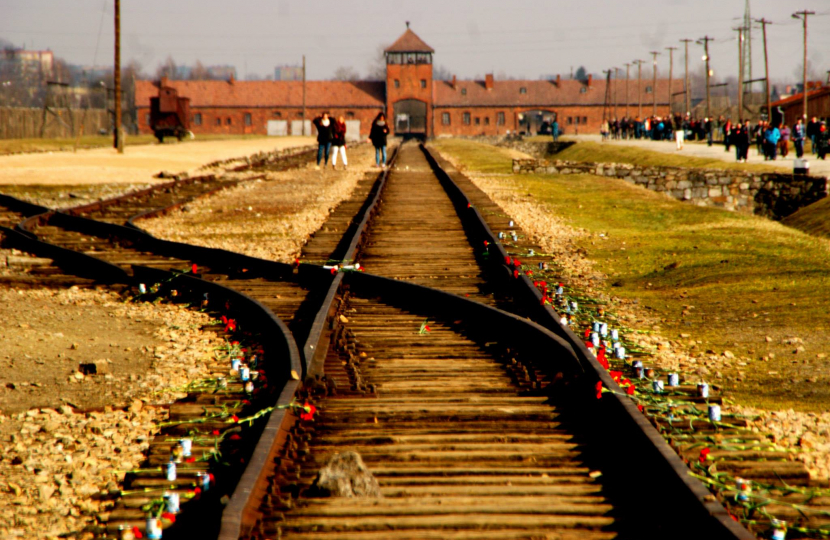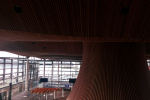
Holocaust Memorial Day takes place on 27th January each year, the anniversary of the liberation of Auschwitz-Birkenau, the largest Nazi death Camp, on 27th January 1945, remembering the millions of people murdered during the Holocaust under Nazi Persecution, and in the genocides which followed in Cambodia, Rwanda, Bosnia and Darfur - and educating generations of young people about this terrible history and the need to stand up against acts of bigotry and hatred today.
In addition to the 6 Million Jewish people murdered in the Holocaust, Nazi authorities also targeted and killed other groups, including children, because of their perceived racial and biological inferiority: Roma and Sinti Gypsies, Disabled Germans, LGBT people and some of the Slavic peoples (especially Poles and Russians).
Other groups were persecuted on political, ideological, and behavioural grounds.
So will the Minister agree that the past informs the future, and that those who fail to learn from the past are doomed to repeat its mistakes and its atrocities?
Auschwitz initially served as a detention centre for political prisoners. However, it evolved into a network of camps where Jewish people and other perceived enemies of the Nazi state were exterminated, often in gas chambers, or used as slave labour.
I visited the rightly unsettling Holocaust Museum when in Israel and last September I made a moving visit to Auschwitz-Birkenau, the largest of the Nazi concentration and death camps.
The empty barracks, the barbed-wire fencing, the solemn exhibits, the telltale chimneys – all these vestiges left a strong impression. But what struck me most was the sheer vastness of the sprawling memorial to history’s most notorious death camp.
I also made an evocative visit to Oskar Schindler's Factory in Krakow.
So how can the Welsh Government hardwire education about the Holocaust, including the horrors that happened in Auschwitz-Birkenau, and other death camps into our Schools and wider information sources for each generation?
You state that the Welsh Government funded the Holocaust Memorial Day Trust to employ a support worker in Wales, you also said this is your Statement on Holocaust Memorial Day last year.
What update can you provide on their activities since then?
Several of my own Children, who attended Castell Alun High School in Flintshire, benefitted from a visit to Auschwitz-Birkenau with the school. They happened to be one of those schools that recognised how important it was that this was given attention, but there are many others that don't.
How can we ensure that this becomes embedded on a more mainstream basis, not just in those schools that are at the forefront of this sort of issue, but those that, perhaps, need to be helped further along the way?
How will this also embed the new resource for secondary schools in Wales about the Romani Holocaust or Porrajmos (poor-rhyme-us) launched by the Romani Cultural & Arts Company with funding from the UK Department for Levelling Up, Housing, and Communities; and how will this ensure public awareness of the close to 250,000 disabled children and adults who were also murdered under the Nazi regime?
North Wales Police recorded a rise in religious hate crime in the weeks following the outbreak of the Hamas-Israel conflict last year.
The number of religious hate crimes recorded by several of Wales’ Police Forces have also seen similar rises.
Does the Minister agree that this is a grim wakeup call, and therefore what further action is the Welsh Government taking to counter this rise in religious and racial hate crime?
I attended the moving 2023 Holocaust Memorial Day Ceremony at Tŷ Pawb, Wrexham, organised by the Association of Voluntary Organisations in Wrexham (AVOW), when the theme chosen by the Holocaust Memorial Day Trust was ‘Ordinary People’.
As you stated, the theme this year is ‘The Fragility of Freedom’.
Reminding ‘us of the slow and subtle erosion of freedoms that create the circumstances that allow genocide to take place. It also urges us not to take our freedoms for granted, and to be mindful of our own responsibility in defending and strengthening freedoms in our communities’.
Would you therefore join me in endorsing the recent Statement by Pope Francis, that “Saturday, 27 January, is International Holocaust Remembrance Day. May the remembrance and condemnation of that horrific extermination of millions of Jews and people of other faiths, which took place in the first half of the last century, help everyone not to forget that the logic of hatred and violence can never be justified, because it denies our very humanity’.
He encouraged us all to pray for peace across the world.

